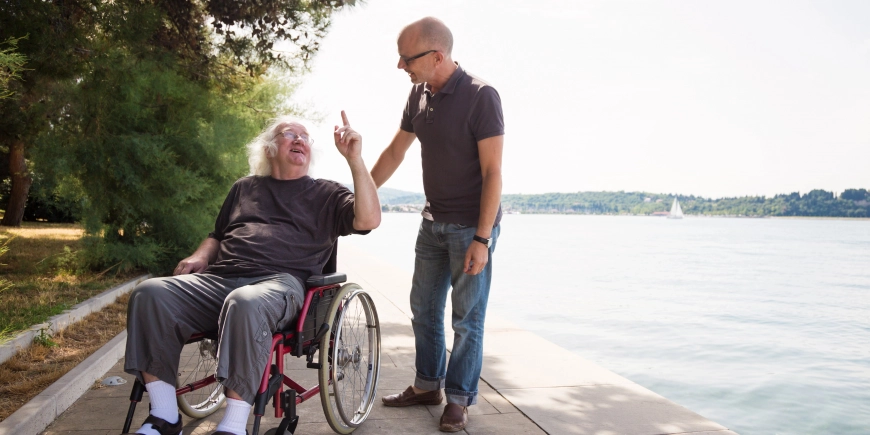Words Matter: Reframing Language to Support All Older Adults

Language Shapes Aging Experiences
I just returned from a national conference where I had the privilege of hearing fantastic presentations from professionals in a variety of fields working with older adults. Again and again, I was reminded of something that is both simple and profound: words matter.
The way we talk about aging and older adults shapes perceptions, influences policy, and directly affects the kinds of resources created. Whether in conference presentations, professional journals, periodicals, or websites, language is never neutral. It either invites inclusion or quietly leaves some people out.
For solo agers, older adults who are navigating life without a reliable support system, language often reveals whether resources truly see them. When forms assume “spouse’s information,” when workshops are titled “Conversations to Have with Your Kids About Your Care,” or when websites say “Talk to your husband or wife about your preferences,” solo agers hear a subtle but undeniable message: this was not designed with you in mind.
«Every older adult deserves to see themselves reflected in the language of resources, programs, and services,»
-Ailene Gearheardt, Navigating Solo™ Network
Why Language Shapes Experience
Language has always been a mirror of social values. The terms we use to describe people carry both history and implication. Phrases like “still independent,” “burden on the system,” or “elderly” may sound harmless but can reinforce stereotypes that older adults are frail, dependent, or less valuable.
The same holds true for family assumptions. Using “family caregiver” as a catch-all erases the many people who support older adults: friends, neighbors, faith community members, and even paid advocates. Solo agers, especially, may rely on a network of chosen family and community, not the “traditional” nuclear model.
Moving Beyond Assumptions
At the conference, I was struck by how many excellent programs unintentionally slipped into limiting language. It was not out of malice, but out of habit. And that’s the real challenge: most of us don’t notice the assumptions embedded in our words because they reflect what has historically been “the norm.”
But norms have shifted. Families are smaller. People are living longer. Many adults are divorced, widowed, child-free, or geographically separated from relatives. Solo aging is a reality for millions. If we want resources to be truly helpful and equitable, our language must reflect the full diversity of aging experiences.
Words to Rethink (and Alternatives)
Here are a few examples of common phrases that deserve reconsideration:
- Instead of: “Talk to your children about your preferences”
Try: “Talk to the people you trust about your preferences.” - Instead of: “When your spouse can no longer help with care…”
Try: “When the people in your support system can no longer help with care…” - Instead of: “Family caregiver support group”
Try: “Care partner and supporter group” - Instead of: “Ask your son or daughter to help you set up online accounts.”
Try: “Ask a trusted friend, neighbor, or support person to help you set up online accounts.”
It may seem like a small shift, but for someone who doesn’t have children, a partner, or immediate family, the difference is enormous.
Five Tips for Professionals: Making Inclusive Language the Norm
- Audit your materials. Review brochures, forms, and websites for assumed relationships. Swap “spouse” or “children” for “trusted person,” “support network,” or “care partner.”
- Model inclusive phrasing. When presenting at conferences or writing for periodicals, intentionally use language that acknowledges different realities. Audiences notice, and it makes your work more accessible.
- Listen to older adults’ self-descriptions. If someone calls their support system “chosen family,” adopt that wording. People define their lives best.
- Train your team. Staff and colleagues benefit from examples of more inclusive phrasing. Make this part of orientation, training, and editorial guidelines.
- Collaborate with solo agers. Involve solo agers in planning programs, reviewing publications, and shaping messaging. They’ll catch gaps that others may overlook.
Reframing is About Respect
When we broaden our language, we are not erasing partnered or family-based aging experiences. Those remain vitally important. Instead, we are expanding the frame so that everyone — married, single, child-free, divorced, widowed, or solo — sees themselves reflected.
Inclusive language validates the reality of older adults who may already feel overlooked. It reduces isolation and signals, “This resource was created with you in mind.” For professionals, it’s a matter of equity, dignity, and effectiveness.
Why It Matters for Solo Agers
For solo agers, language is more than semantics. It directly shapes access to care and planning. If every workshop, article, or form assumes family involvement, solo agers may wrongly conclude there are no resources for them or worse, that their needs are invisible.
That invisibility can lead to delayed planning, weaker support networks, and unnecessary crises. By contrast, inclusive language invites solo agers into conversations about advance care planning, healthcare, housing, and finances. It helps them build strong, age-diverse support systems that allow them to thrive.
A Call to Action
As professionals, advocates, and peers, we have an opportunity to lead change in how aging is framed. The words we use today will shape the policies, resources, and perceptions of tomorrow.
The challenge is simple: audit your words. Notice who is included, who is assumed, and who might be unintentionally excluded. Then, make the shift. Update your materials, reframe your presentations, and encourage colleagues to do the same.
It’s a small but powerful step toward creating an age-inclusive society where everyone — solo agers, parents, partners, and friends — has access to the dignity and support they deserve.
Resources for Solo Agers and Professionals
If you’d like to learn more about solo aging, access planning tools, and find resources for the solo agers you serve, visit the Navigating Solo™ Network. It offers a free resource library, a podcast, blog, events, and tools designed specifically for solo agers. I encourage you to explore our vast resources.
Language matters. The words we use shape how older adults see themselves and how professionals, organizations, and communities design programs and services.
 If you’d like practical strategies and examples, download my free resource:
If you’d like practical strategies and examples, download my free resource:
Language Matters: A Guide to Inclusive Communication for Solo Agers & Professionals, available here.
© Beacon Patient Solutions LLC, 2025. All Rights Reserved.
Originally posted on The Navigating Solo Network's Blog, 8.25.2025
